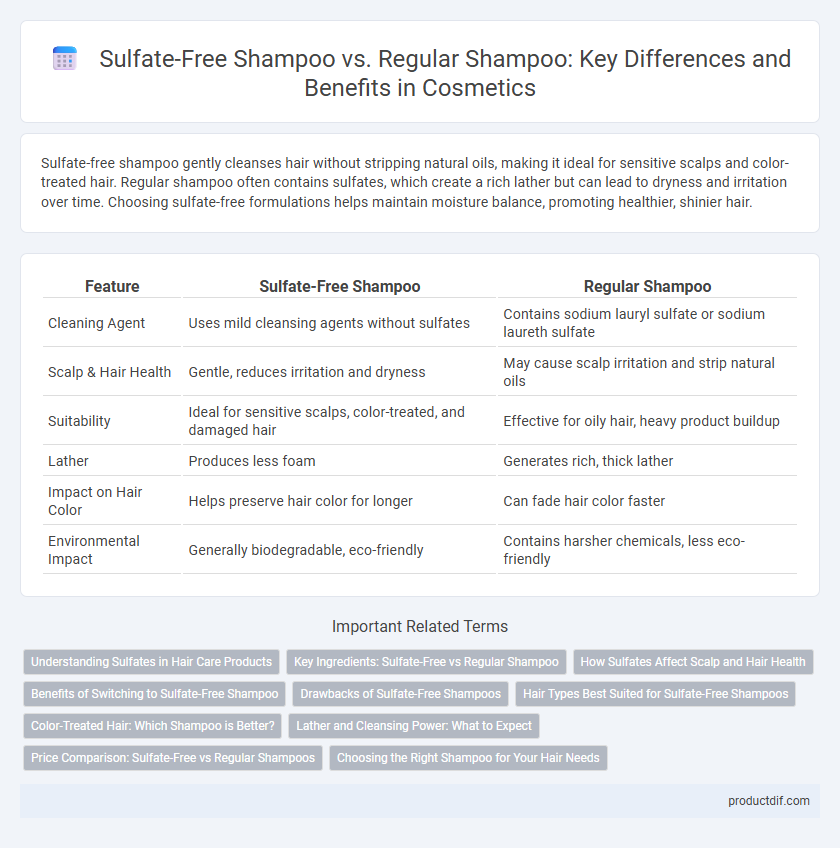Sulfate-free shampoo gently cleanses hair without stripping natural oils, making it ideal for sensitive scalps and color-treated hair. Regular shampoo often contains sulfates, which create a rich lather but can lead to dryness and irritation over time. Choosing sulfate-free formulations helps maintain moisture balance, promoting healthier, shinier hair.
Table of Comparison
| Feature | Sulfate-Free Shampoo | Regular Shampoo |
|---|---|---|
| Cleaning Agent | Uses mild cleansing agents without sulfates | Contains sodium lauryl sulfate or sodium laureth sulfate |
| Scalp & Hair Health | Gentle, reduces irritation and dryness | May cause scalp irritation and strip natural oils |
| Suitability | Ideal for sensitive scalps, color-treated, and damaged hair | Effective for oily hair, heavy product buildup |
| Lather | Produces less foam | Generates rich, thick lather |
| Impact on Hair Color | Helps preserve hair color for longer | Can fade hair color faster |
| Environmental Impact | Generally biodegradable, eco-friendly | Contains harsher chemicals, less eco-friendly |
Understanding Sulfates in Hair Care Products
Sulfates, commonly found in regular shampoos, act as powerful cleansing agents that create lather but can strip natural oils, potentially causing dryness and irritation for sensitive scalps. Sulfate-free shampoos use gentler surfactants like cocamidopropyl betaine, preserving the hair's natural moisture balance and reducing the risk of damage or color fading. Understanding the chemical properties and effects of sulfates helps consumers make informed choices for tailored hair care routines that maintain scalp health and hair integrity.
Key Ingredients: Sulfate-Free vs Regular Shampoo
Sulfate-free shampoos utilize gentle surfactants like decyl glucoside and cocamidopropyl betaine, effectively cleansing hair without stripping natural oils or causing scalp irritation. Regular shampoos commonly contain sulfates such as sodium lauryl sulfate (SLS) or sodium laureth sulfate (SLES), which create a rich lather but can lead to dryness and color fading. Choosing sulfate-free formulas supports moisture retention and maintains hair health, particularly for sensitive scalps and color-treated hair.
How Sulfates Affect Scalp and Hair Health
Sulfate-free shampoos minimize scalp irritation and preserve natural oils, promoting healthier hair and reduced dryness. Regular shampoos containing sulfates like Sodium Lauryl Sulfate effectively cleanse but can strip hair of essential moisture, leading to dryness, frizz, and potential scalp sensitivity. Choosing sulfate-free options supports balanced scalp pH and maintains hair's natural strength and shine.
Benefits of Switching to Sulfate-Free Shampoo
Sulfate-free shampoo offers gentle cleansing without stripping natural oils, making it ideal for sensitive scalps and color-treated hair. It helps maintain hair moisture, reduces irritation, and prevents dryness and frizz commonly caused by regular shampoos containing sodium lauryl sulfate. Switching to sulfate-free formulas promotes healthier, shinier, and more manageable hair over time.
Drawbacks of Sulfate-Free Shampoos
Sulfate-free shampoos often struggle with less effective cleansing due to the absence of strong surfactants like sodium lauryl sulfate, which can leave heavy residue on oily or product-laden hair. These shampoos may also cause buildup over time, leading to dullness and scalp irritation for some users. Furthermore, sulfate-free formulas can be more expensive and have a shorter shelf life compared to regular shampoos containing sulfates.
Hair Types Best Suited for Sulfate-Free Shampoos
Sulfate-free shampoos are ideal for individuals with dry, color-treated, or sensitive scalps as they gently cleanse without stripping natural oils. Curly and wavy hair types benefit from sulfate-free formulations that help maintain moisture and reduce frizz. In contrast, regular shampoos containing sulfates are better suited for oily scalps or heavy product buildup due to their stronger cleansing action.
Color-Treated Hair: Which Shampoo is Better?
Sulfate-free shampoos are gentler on color-treated hair, preventing premature fading and maintaining vibrancy by avoiding harsh detergents like sodium lauryl sulfate. Regular shampoos containing sulfates can strip natural oils and color molecules, leading to dryness and dullness over time. Choosing sulfate-free shampoo enhances color retention and hair health for longer-lasting shine and softness in dyed hair.
Lather and Cleansing Power: What to Expect
Sulfate-free shampoos produce a gentler, less foamy lather compared to regular shampoos, which typically contain sodium lauryl sulfate for rich, bubbly suds. Although sulfate-free formulas may create less foam, they effectively cleanse hair by removing dirt and excess oils without stripping natural moisture. Regular shampoos offer a stronger cleansing power suitable for oily or heavily styled hair but can sometimes cause dryness or irritation for sensitive scalps.
Price Comparison: Sulfate-Free vs Regular Shampoos
Sulfate-free shampoos typically cost 15% to 40% more than regular shampoos due to specialized formulations using gentler surfactants. Regular shampoos often utilize cheaper sulfates like sodium lauryl sulfate, making them more budget-friendly but potentially harsher on hair. Consumers prioritize sulfate-free options for sensitive scalps despite the higher price point, valuing long-term hair health over initial cost savings.
Choosing the Right Shampoo for Your Hair Needs
Sulfate-free shampoos gently cleanse hair by removing dirt without stripping natural oils, making them ideal for sensitive scalps, color-treated, or dry hair. Regular shampoos often contain sodium lauryl sulfate (SLS) or sodium laureth sulfate (SLES), which create a rich lather but can cause dryness or irritation in some hair types. Selecting the right shampoo depends on hair texture, scalp sensitivity, and whether hair is chemically treated or naturally oily.
Sulfate-free shampoo vs Regular shampoo Infographic

 productdif.com
productdif.com